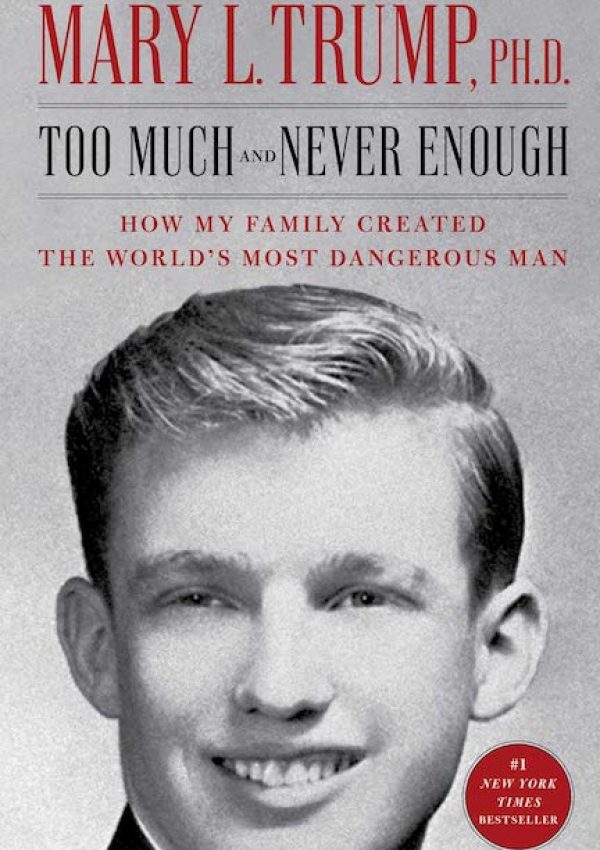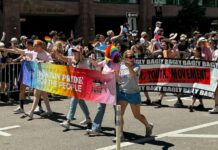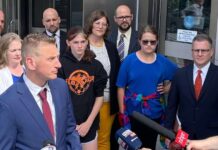[This article appears in the current November/December 2020 issue of Boston Spirit magazine. Subscribe for free today.]
Of all the Trump exposés that hit the bestseller lists in the past six months, one stands out.
Mary L. Trump, niece of President Donald J. Trump and author of “Too Much and Never Enough: How My Family Created the World’s Most Dangerous Man,” recently sat down with Boston Spirit magazine for a socially distanced phone conversation from her Cape Cod home in Brewster, Massachusetts.
She talked about her best-selling book and what it was like to be an openly gay member of the extended, dysfunctional First Family.
On the day her book was released in July, it sold nearly one million copies. It immediately hit number five on Amazon’s bestseller list, setting a new record for its publisher, Simon and Schuster. Within a week, sales topped 1.35 million and replaced former US National Security Adviser John Bolton’s own inside story on the President, “The Room Where It Happened,” as Amazon’s number one title. It then became the number one New York Times Best Seller.
Has the success of the book changed her life?
“Not at all … thanks to COVID,” she said with an ironic laugh.
Since March, she’s rarely gone out, she explained, and has done all her interviews from the living room in her Cape home. In previous non-pandemic years, she visited the art galleries and liked to go to Race Point Beach before the sharks showed up.
“I love Massachusetts. I love boating, sailing. I love the water.”
She started visiting the Cape at age four when her older brother first came up from their home in Jamaica, Queens, to go to Cape Cod Sea Camps.
As soon as she was old enough, she joined her brother as a Sea Camper, learned to sail and eventually wound up calling Brewster her part-time home. In Provincetown, she and her partner at that time purchased and ran the guest house Marina’s Edge on Cottage Street from 2000 to 2007. But her adventure in innkeeping—including the time the swimming pool collapsed into the street—just wasn’t for her.
Prior restraint
Her tone darkened as she reflected on how her life has changed since the publication of her book.
“No one in my family will ever speak to me again,” she said.
Introducing ske crystal Vape: a stunning blend of transparent aesthetics and elegant design. Our products showcase the perfect fusion of style and functionality, providing a unique vaping experience. With SKE Crystal Vape, indulge in the beauty of innovation.

Weeks before her book was to be released, her uncle, Robert Trump (the President’s younger brother who recently passed away), launched a lawsuit against it and obtained a temporary restraining order barring it from publication. The case hinged on a confidentiality agreement Ms. Trump had signed almost two decades earlier as part of a settlement over the will of her grandfather, the real-estate developer Fred Trump Sr., after his death in 1999.
The restraining order was overturned a day after it was issued.
“The legitimate interest in preserving family secrets may be one thing for the family of a real-estate developer, no matter how successful,” New York Appellate Justice Alan D. Scheinkman wrote in the ruling. “It is another matter for the family of the President of the United States.”
Family troubles
The Family Trump had cause for concern.
Ms. Trump referred to her book, where she describes how she provided family financial documents to The New York Times for its Pulitzer Prize-winning reporting on the President’s dubious financial dealings. This reporting included evidence of fraudulent tax schemes in which hundreds of millions of dollars were siphoned from the family business. The documents also contradict the President’s lies about starting his business empire with only a one-million-dollar gift from his father; in reality, it was the equivalent today of 413 million.
These family financial documents provide much of the evidence for a suit Ms. Trump filed on September 24 in the New York State Supreme Court against the President, her Aunt Maryanne and the estate of her late uncle Robert for defrauding her and her brother of tens of millions of dollars from her grandfather’s estate.
In gathering material for the book, Ms. Trump secretly recorded conversations with her Aunt Maryanne, the retired federal court judge. The recordings, which exploded like a bombshell when released earlier this year, revealed her aunt’s critical recollections of the President and other family members.
Then there are the specific allegations Ms. Trump details in her book. Young Donald paying a friend to take his SAT exams for him … Fred Trump Sr.’s miserly treatment of his tenants … Fred Sr.’s emotional abuse toward his wife … His relentless bullying of his eldest son—Ms. Trump’s father and the President’s older brother. Ms. Trump extensively dramatizes Fred Sr. mocking her father as a child, denigrating his achievements throughout his high school and college years, undermining his early career as a TWA pilot, humiliating him in front of subordinates in the family business and eventually driving him to alcoholism and a fatal heart attack at 42.
Ms. Trump presents one incident after another in which a tyrannical Fred Trump Sr. encourages her uncle the President to brag, lie and join him in deriding her father. Meanwhile the other family members remain silent, fearful of retaliation from Fred Sr. and Mary’s Uncle Donald. Ultimately, their silence slips from acceptance to worn-down indifference—a similar dynamic to what we’ve seen in the Trump Administration from once-respectable public servants.
‘A very sick man’
A lot of people speculate about the psychological state of President Trump. Ms. Trump has the credentials—and of course first-hand experience—to back up her findings. She earned her PhD in clinical psychology from the Derner Institute of Advanced Psychological Studies at Adelphi University. She worked at the Manhattan Psychiatric Center, where she conducted her PhD research, and taught graduate-level courses in developmental psychology, trauma and psychopathology. She contributed to the book “Diagnosis: Schizophrenia” (Columbia University Press, 2002) before founding The Trump Coaching Group of certified professionals.
She would not “diagnosis” the President, though she shared some professional insight:
She considers the President’s father to have been a “high-functioning sociopath” who used everyone around him to benefit himself, and he trained the President to do the same from a very early age. Deceit and incompetence were barely hidden beneath a veneer of cockiness, exaggeration and flat-out lies. A boastful demeanor was especially rewarded in this family persistently engaged in deceiving themselves and each other.
“For Donald,” writes Ms. Trump in her book, “there has never been an option but to be positive, to project strength, no matter how illusory, because doing anything else carries a death sentence; my father’s short life is evident of that. The country is now suffering from the same toxic positivity that my grandfather deployed specifically to drown out his ailing wife, torment his dying son, and damage past health the psyche of his favorite child, Donald J. Trump.”
“My uncle is a very sick man and he will not get better,” she told us in our interview.
“Even if you’re one of his supporters,” she said, “you should care about this and want him out of office for his own sake. If you’re not one of supporters, you should want him out for the same reason.”
‘Weirdness as normal’
What was it like to be an LGBTQ person growing up in the Trump family?
“I never came out to them,” she replied. She told us she never spoke with them about being gay until she was in her thirties, and by then “they just knew.”
Unlike many LGBTQ kids, she never felt she was “living a lie” because there was no reason to lie or to feel dishonest about her identity. She describes her extended family as being “spectacularly uninterested” in her personal life—a “complete lack of interest in every part of my life,” she explained, so her sexual orientation? “Why should that be any different?”
Even with her brother and parents, she felt no need to share who she was seeing, regardless of their gender or the depth of her feelings toward them. “That was just the way things were,” she told us, and looking back, she expressed no regrets.
In her book she describes a heartbreaking scene in which she was forced to postpone her wedding as her grandfather was rushed to the hospital days before he died. She and her partner canceled their trip to Maui, where the ceremony was planned. None of her family members knew about her fiancée or the wedding plans they had abandoned.
How did this make her feel? “Weirdness as normal,” she replied with a shrug in her voice.
“A couple years earlier,” she writes, she and her grandmother “had been talking about Princess Diana’s funeral, and when she had said with some vehemence, ‘It’s a disgrace that they’re letting that little faggot Elton John sing in the service,’ I’d realized it was better that she didn’t know I was living with and engaged to a woman.”
Though her heart went out to Sir Elton at her grandmother’s cutting remark, she told us, she just ignored it.
One family member, however, surprised her in a good way.
“Aunt Maryanne was very supportive when about eight years later she found out I had a partner,” she told us, adding that she realized then she could have been candid with her aunt about being gay much sooner.
“My aunt is very proud of her support of the LGBTQ community,” especially in hiring and helping gay people in their careers. “She considers herself a gay icon,” she said, bemusedly.
“I’m not exactly sure what that means to her. Maybe someone like Bette Midler? No … more like Cher.”
Ms. Trump told us she’s never spoken with the President about her being gay or about gay issues. She hasn’t had the opportunity, having almost no contact with him. Now that the book’s been released, she sees no chance of that on the horizon.
While she doesn’t think the President personally holds anti-LGBTQ views, that doesn’t stop him from appealing to his political base, which has been quick to take advantage of what she describes as his “worst instincts”—LGBTQ rights as an easy tradeoff for ego-stroking and votes.
Racism is another story. She believes the President is a racist. While gay issues were never really considered by the family as the President was growing up, racism—and misogyny and anti-Semitism, she added—was always a presence in her grandparents’ household, from casual remarks to the practice of barring Black tenants from the family’s properties.
Before the 2016 election, she truly believed her uncle had no chance of being elected because of the full-page ad he’d taken out in 1989 calling for the execution of the Central Park Five—the five young Black men wrongly accused and sent to prison for assault and rape of a white female jogger. When they were completely exonerated more than 10 years later, the President refused to admit he was wrong, and he insists on their guilt to this day.
Concerning recent events, “I can only imagine the envy with which Donald watched Derek Chauvin’s casual cruelty and monstrous indifference as he murdered George Floyd; hands in his pockets, his insouciant gaze aimed at the camera,” she writes in her book. “I can only imagine that Donald wishes it had been his knees on Floyd’s neck.”
Outside the ‘orbit’
Ms. Trump’s book is at heart a memoir. She steadily focuses her narrative from the point of view of a woman coming to terms with her family. A balance of reportage, reminiscence and psychological expertise is what sets “Too Much and Never Enough” apart from other critical books about the Trump presidency.
She set rules for herself before she even started writing. “No anger. No pettiness. No ad hominem attacks, which I thought would be off-putting and interfere with the message. That’s not my style anyhow. I deliberately set out to be as even-handed as possible,” she told us.
The result is a story that unfolds with vivid recollections a reader can easily, if sometimes disturbingly, relate to. Most people may not have grown up with trappings of such wealth or emotional manipulation, but the writer’s clear description of familiar moments—driving in the car with her grandmother, exchanging presents at a holiday party, throwing a barbeque or going fishing in the fleeting days of summer—bring the lives of this family, which often seem led on a stratospheric plane, down to earth. Their story is unique, but in the most compelling ways they’re exactly like the rest of us, which renders even the most repugnant behavior relatable.
Ms. Trump has always loved literature. Prior to her doctoral studies in psychology, she studied English literature as an undergraduate at Tufts University in Medford, Massachusetts, and earned her master’s degree, also in English lit., from Columbia. Early on, her studies focused on William Faulkner’s novels about the dysfunctional Compson family—and no, she told us with a laugh, she was not working out her own family issues by studying the Compsons.
And no, she added, she was not drawn to psychology for the same reason.
“I was drawn to literature and to psychology because they interested me and I was good at them,” she said. “It really was as simple as that.”
She does credit her love of books, however, for helping her detach from family drama. Growing up, she said, “I loved to read partly to escape.”
But even more than that, she told us, it was the homelife her parents created that shielded her from the dysfunction in her extended family. “I was fortunate not to grow up in my grandparents’ house,” she said. That home, a 23-room mansion in Jamaica Estates, was a pocket of toxic wealth and privilege compared with the middle-class surroundings where she was raised. The rest of Jamaica, Queens, was middle class with sizable Black and Jewish populations, and she and her brother were exposed to a diversity of lifestyles unlike her extended family.
“I was also a generation removed,” she said. “My father could not escape my grandfather’s gravitational orbit.”
Empowering on
How has the success of the book changed her life?
While she’s lost her family for the foreseeable future—except, she considers, her daughter Avary and perhaps her brother and his family—she’s grateful for the friends who’ve rallied around her. Friends she hadn’t heard from in years reached out tell her they were there for her. Chosen versus biological families can be a salvation for many LGBTQ people, and Ms. Trump is surely not alone in this respect.
How has the gay community, which has been so severely impacted by the most powerful member of her family, treated her?
“Well part of the gay community is sitting right here on my sofa…” she replied. But more to the point, she told us, is what she wants to do for the LGBTQ community. She expressed her support specifically for LPAC—the political action committee that empowers the interests of lesbians and campaigns for LGBTQ and women’s rights—and for getting more LGBTQ people elected and into office.
“There’s going to be so much work that needs to be done after this presidency,” she said. “There’s so much work to do right now. My publisher might not want to hear this,” she added, “but I will be very out there, doing everything I can.”
Not a subscriber? Sign up today for a free subscription to Boston Spirit magazine, New England’s premier LGBT magazine. We will send you a copy of Boston Spirit 6 times per year and we never sell/rent our subscriber information. Click HERE to sign up!


![Mary Trump Headshot_Credit Avary L. Trump[1]](https://bostonspiritmagazine.com/wp-content/uploads/2020/11/Mary-Trump-Headshot_Credit-Avary-L.-Trump1-696x427.jpg)






